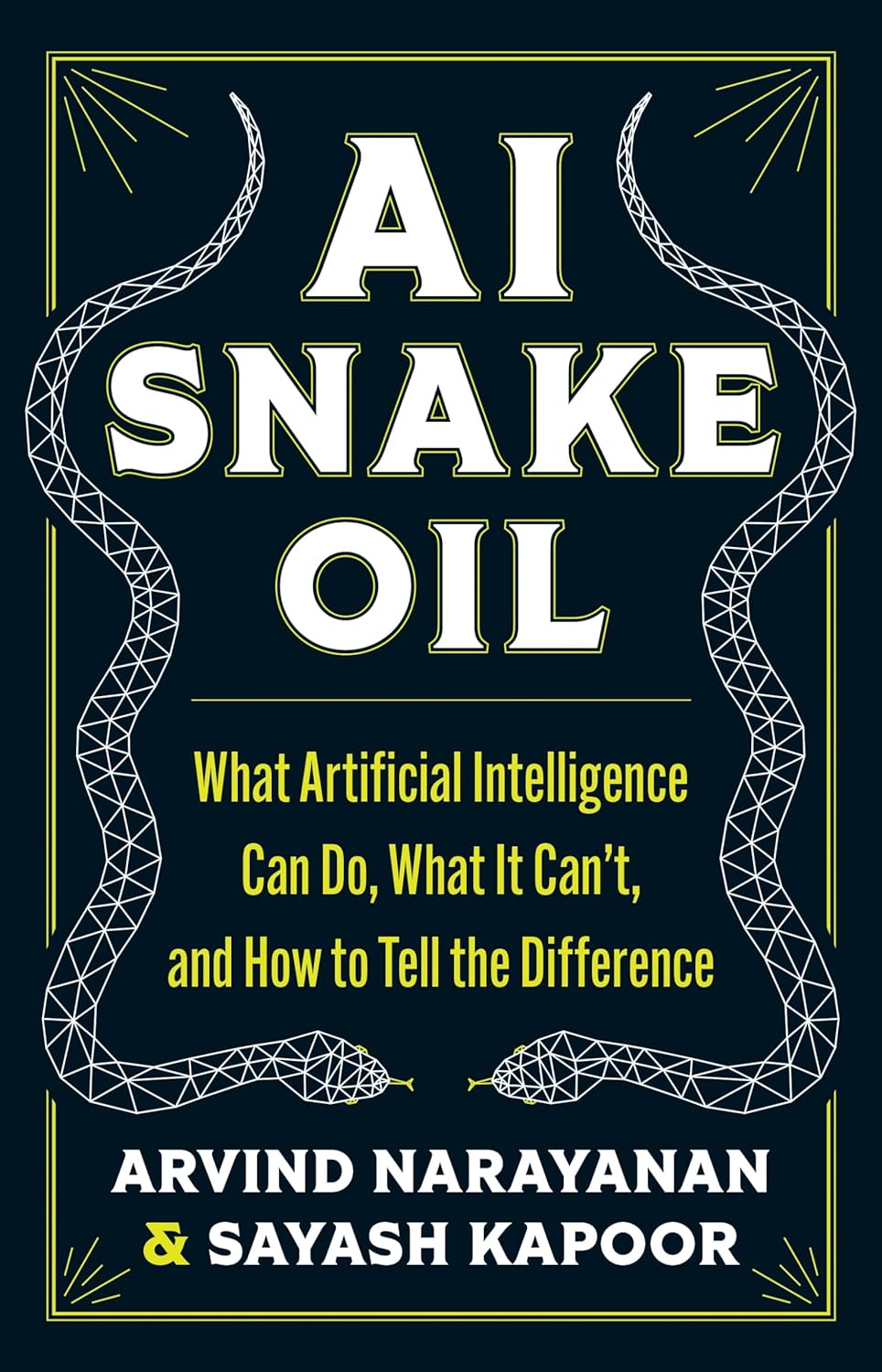 Zusammenfassungen
Zusammenfassungen
 Confused about AI and worried about what it means for your future and the future of the world? You’re not alone. AI is everywhere—and few things are surrounded by so much hype, misinformation, and misunderstanding. In AI Snake Oil, computer scientists Arvind Narayanan and Sayash Kapoor cut through the confusion to give you an essential understanding of how AI works, why it often doesn’t, where it might be useful or harmful, and when you should suspect that companies are using AI hype to sell AI snake oil—products that don’t work, and probably never will.
Confused about AI and worried about what it means for your future and the future of the world? You’re not alone. AI is everywhere—and few things are surrounded by so much hype, misinformation, and misunderstanding. In AI Snake Oil, computer scientists Arvind Narayanan and Sayash Kapoor cut through the confusion to give you an essential understanding of how AI works, why it often doesn’t, where it might be useful or harmful, and when you should suspect that companies are using AI hype to sell AI snake oil—products that don’t work, and probably never will.
While acknowledging the potential of some AI, such as ChatGPT, AI Snake Oil uncovers rampant misleading claims about the capabilities of AI and describes the serious harms AI is already causing in how it’s being built, marketed, and used in areas such as education, medicine, hiring, banking, insurance, and criminal justice. The book explains the crucial differences between types of AI, why organizations are falling for AI snake oil, why AI can’t fix social media, why AI isn’t an existential risk, and why we should be far more worried about what people will do with AI than about anything AI will do on its own. The book also warns of the dangers of a world where AI continues to be controlled by largely unaccountable big tech companies.
By revealing AI’s limits and real risks, AI Snake Oil will help you make better decisions about whether and how to use AI at work and home.
 Bemerkungen zu diesem Buch
Bemerkungen zu diesem Buch
 This book is about the types of AI that are problematic in some way, because you wouldn’t want to read three hundred pages on the virtues of spell-check. But it’s important to recognize that not all AI is problematic—far from it.
This book is about the types of AI that are problematic in some way, because you wouldn’t want to read three hundred pages on the virtues of spell-check. But it’s important to recognize that not all AI is problematic—far from it. Kapitel
Kapitel 
 Dieses Buch erwähnt ...
Dieses Buch erwähnt ...
 Dieses Buch erwähnt vermutlich nicht ...
Dieses Buch erwähnt vermutlich nicht ... 
 Nicht erwähnte Begriffe | 2D-Barcodes, Apple, argumentum ad hominem, argumentum ad hominem circumstantial, argumentum ad hominem tu quoque, argumentum ad ignorantiam, blockchain, bluesky, Chatbot, Daten, Digitalisierung, Eltern, Fediverse, GMLS & Bildung, GMLS & Schule, LehrerIn, Lernen, Negative Rückkoppelung, Positive Rückkoppelung / Teufelskreis, Schule, Siri, slippery slope, snapchat, Sprachassistenten, straw man, Tablet, Ukraine, Unterricht |
 Tagcloud
Tagcloud
 Zitationsgraph
Zitationsgraph
 Zitationsgraph (Beta-Test mit vis.js)
Zitationsgraph (Beta-Test mit vis.js)
 1 Erwähnungen
1 Erwähnungen 
- Education for the Age of AI (Charles Fadel, Alexis Black, Robbie Taylor, Janet Slesinski, Katie Dunn) (2024)

 Volltext dieses Dokuments
Volltext dieses Dokuments
 Anderswo suchen
Anderswo suchen 
 Beat und dieses Buch
Beat und dieses Buch
Beat hat dieses Buch während seiner Zeit am Institut für Medien und Schule (IMS) ins Biblionetz aufgenommen. Beat besitzt kein physisches, aber ein digitales Exemplar. (das er aber aus Urheberrechtsgründen nicht einfach weitergeben darf). Aufgrund der vielen Verknüpfungen im Biblionetz scheint er sich intensiver damit befasst zu haben. Es gibt bisher nur wenige Objekte im Biblionetz, die dieses Werk zitieren.










 Algorithmus
Algorithmus amazon
amazon Arbeitslosigkeit
Arbeitslosigkeit bias
bias bitcoin
bitcoin Bullshit
Bullshit Chat-GPT
Chat-GPT China
China cloud computing
cloud computing Datenbank
Datenbank deep learning
deep learning deepfake
deepfake Demokratie
Demokratie E-Assessment
E-Assessment E-Learning
E-Learning Eliza
Eliza Empfehlungs-Algorithmus
Empfehlungs-Algorithmus facebook
facebook Familie
Familie Fehler
Fehler Generation Alpha
Generation Alpha Generative Machine-Learning-Systeme (GMLS)
Generative Machine-Learning-Systeme (GMLS) Generative Pretrained Transformer 3 (GPT-3)
Generative Pretrained Transformer 3 (GPT-3) Generative Pretrained Transformer 4 (GPT-4)
Generative Pretrained Transformer 4 (GPT-4) Gesellschaft
Gesellschaft Gesichtserkennung
Gesichtserkennung Google
Google Hype Cycle
Hype Cycle influencer
influencer Instagram
Instagram Internet
Internet iPad
iPad iPhone
iPhone Journalismus
Journalismus Kinder
Kinder Künstliche Intelligenz (KI / AI)
Künstliche Intelligenz (KI / AI) machine learning
machine learning Mastodon
Mastodon Microsoft
Microsoft Perceptron
Perceptron PowerPoint
PowerPoint Predictive Analytics
Predictive Analytics Privatsphäre
Privatsphäre Psychologie
Psychologie QR Code
QR Code Ranking
Ranking Roboter
Roboter Russland
Russland Schach
Schach social media / Soziale Medien
social media / Soziale Medien Sprache
Sprache Tiktok
Tiktok Twitter
Twitter Uber
Uber Waffe
Waffe WhatsApp
WhatsApp Wissenschaft
Wissenschaft WWW (World Wide Web)
WWW (World Wide Web) Zukunft
Zukunft


 Biblionetz-History
Biblionetz-History